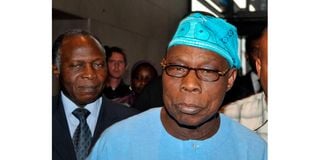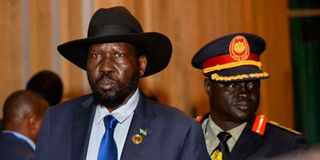
The African Union headquarters in Addis Ababa, Ethiopia.
| Michael Tewelde | AFPTigray crisis: AU juggles perception balls as Ethiopia, TPLF dig in
The African Union (AU) could be playing a tricky balancing act as it seeks to help Ethiopia mitigate a deadly conflict in the country’s Tigray region.
Headquartered in Addis Ababa, the country’s capital, the AU has called for dialogue and peace, while also cautioning the world against pushing Ethiopia’s hand and violating its territorial integrity. That has proved to be equal parts pleasing and annoying to the parties in the conflict that started in November last year.
Last week, the AU announced Nigerian ex-president Olusegun Obasanjo as the new High Representative for the Horn of Africa region. While the continental body did not single out the Ethiopian conflict, AU Commission chair Moussa Faki Mahamat did suggest that Obasanjo will immediately dive into active conflicts in the Horn.

Nigeria's ex-president Olusegun Obasanjo.
But how Obasanjo will tackle his new role with regard to Tigray is uncertain. Back in November, when the conflict was just starting, South African President Cyril Ramaphosa, the then AU chair, sent a delegation to Addis Ababa to get the parties to talk.
However, Addis Ababa declined the offer involving the Panel of Eminent Persons comprising former presidents Ellen Johnson Sirleaf, Joaquim Chissano and Kgalema Motlanthe.
Prime Minister Abiy Ahmed met with the ex-presidents, but argued that the operation against the Tigray People’s Liberation Front (TPLF) was a law enforcement operation guided by local laws, not an international conflict.
Ten months down the line, Addis Ababa has declared TPLF, once a powerful part of the country’s former ruling party, as a terrorist group and ruled out any dialogue with the rebels, even though a national dialogue conference is scheduled in the country later this month.
“TPLF is not the victim. It is the culprit. The people of Ethiopia especially those in Afar, Amhara and Tigray region are living under undeserved and insufferable conditions,” Taye Atske Selassie, Ethiopia’s Permanent Representative to the UN, told the UN Security Council in a lengthy statement.
“We are startled by everyone that appears to have been calling for peace and pressuring the government to suspend its law enforcement operation amid expansion of violence and mayhem by the TPLF.”
The diplomat suggested TPLF had stood in the way of PM Abiy’s reform programme and had received support from certain unnamed Western backers.
At the AU, Ethiopia has been vocal in asking the bloc to help resolve the Nile dispute with neighbours Sudan and Egypt. But it has not directly asked for support from the bloc regarding the conflict in Tigray. As a practice, AU member states may ask the AU to intervene and restore peace and security.
Ethiopia, instead, accuses outsiders of ‘fueling misinformation’.
TPLF: Pro-Obasanjo but suspicious of AU
But the TPLF sees the AU as biased, even though the group said it welcomes Obasanjo’s role.
“It is clear that we in Tigray are not in any way opposed to the ideals the AU stands for or against Obasanjo’s role,” Getachew Reda, TPLF spokesman, said in a statement on Monday.
“What we are hard pressed to know is how people would reasonably expect a constructive role from an institution that has given partiality a very bad name.”
“There is hardly any record of the AUC ever discussing the war on Tigray in earnest. I know it is a luxury they can ill afford, have they ever tried to reach out to the people of Tigray or its leaders?" Getachew posed.
The AU’s challenge, say diplomats, is having the resources to push Addis to the table with a group it sees as keen to dismember Ethiopia with terror.
“The violence presently afflicting the people and country of Ethiopia is the product of conflicting views of the country’s future. It has erupted and worsened because the country’s conflict prevention and resolution tools have, until now, been inadequate to the task,” said Dr Martin Kimani, Kenya’s Permanent Representative to the UN, while presenting Africa’s position on the Ethiopian conflict last week.
“The resolution to this crisis requires that we undertake a mediation of the deep divides as part of an Ethiopian-owned process supported by the available Peace and Security Architecture and practices especially those of the African Union,” he told the Council on behalf of other African members known as A3+1 that includes Niger and Tunisia, as well as St Vincent and the Grenadines.
Humanitarian crisis
The UN and Western powers have been calling for a ceasefire and dialogue, arguing it could alleviate the ongoing humanitarian crisis.
“All parties must come to an unconditional ceasefire. They must choose a peaceful path for Ethiopia. An inclusive political dialogue is needed. Foreign forces must leave the country," UN Secretary-General Antonio Guterres told the Security Council.
Both parties accuse each another of causing civilian suffering.
The Tigray conflict, which has now spread to other regions of the country, has claimed the lives of tens of thousands of people and displaced over two million.
Shuttle diplomacy
Addis Ababa, in the meantime, has relaunched shuttle diplomacy with neighbours to explain why TPLF should be banished and not negotiated with.
At a meeting in Addis Ababa last week, South Sudan’s President Salva Kiir told his host, PM Abiy, that he supported Ethiopia’s resolve to refuse external influence on the conflict.

South Sudanese President Salva Kiir.
“We do not accept foreign interference in Ethiopia’s quest for independence and sovereignty,” President Kiir said, according to a dispatch from the premier’s office.
President Kiir condemned the TPLF for attacking Ethiopia’s defence forces.
PM Abiy has since flown to Uganda and Rwanda for discussions on matters of “mutual concern”. On Tuesday, he spoke with Djibouti President Ismail Omar Guelleh, who recently hosted Jeffrey Feltman, the US special envoy for the Horn of Africa.
Djibouti, which has retained stable ties with Ethiopia after the transition, could influence what Addis decides to do to end the conflict.
The AU, in the meantime, is likely to play no pusher.
Dr Kimani suggests that Ethiopia must lead the peace process and may have to compromise on a number of issues.
“Peace cannot be made with a political movement that has been labelled as a terrorist group. Parliament should prepare to lift this designation to allow for direct contact and negotiation with armed actors opposing the government.”






